Read: Esther 2:1-18
So, as they had made known to him the people of Mordecai, Haman sought to destroy all the Jews, the people of Mordecai, throughout the whole kingdom of Ahasuerus. (v. 6)
It must have irked Mordecai to be passed over for promotion. After all, he had just saved the king from two assassins. And yet, when chapter three begins we are told that “after these things” someone named Haman is promoted. This is not what we as readers expect—and it’s probably not what Mordecai expected either!
Was it resentment that made Mordecai refuse to bow down? Perhaps. Or maybe it was Haman’s family tree that stiffened Mordecai’s spine. Haman was, after all, an “Agagite,” that is, a descendent of the Canaanite king, Agag, who years before had cost Saul the kingship (see 1 Samuel 15). But could “bad blood” have been enough to make Mordecai disobey a direct order from the king?
Frustrating as it is for modern readers, the Bible doesn’t tell us the reason for Mordecai’s refusal. Maybe that’s because the Bible is more interested in the effect than the cause. Whatever Mordecai’s motivation, his act sparks a hate so disproportionate in Haman that we have only one word for it: genocide. There is nothing reasonable about that reality. It stalks our world still. Perhaps the real question is not “Why does this happen?” but “What are we going to do to end it?” —Carol Bechtel
As you pray, ask God to open your eyes to victims of hate. Ask God to guide you in ways to reach out and help them.
The Rev. Dr. Carol Bechtel is Professor of Old Testament at Western Theological Seminary in Holland, Michigan where she has taught since 1994. Dr. Bechtel preaches and teaches widely and is a General Synod Professor of Theology in the Reformed Church in America. She served as President of the RCA’s General Synod and moderator of its General Synod Council. She also serves as the Executive Director of the American Waldensian Society. Her publications include a commentary on Esther for the Interpretation series, and several Bible study books and curricula.
She now lives in Holland, Michigan with her husband, Tom Mullens. They have four children and seven grandchildren. Her hobbies include singing, cooking, gardening, and the Celtic harp.
- Carol Bechtelhttps://www.woh.org/author/carol-bechtel/
- Carol Bechtelhttps://www.woh.org/author/carol-bechtel/
- Carol Bechtelhttps://www.woh.org/author/carol-bechtel/
- Carol Bechtelhttps://www.woh.org/author/carol-bechtel/


